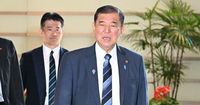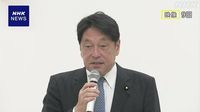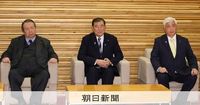On April 9, 2025, the Japanese government and ruling parties began discussions on implementing a supplementary budget to address potential tariffs imposed by the Trump administration. This move comes as part of broader economic measures aimed at mitigating the effects of rising prices and ensuring the stability of domestic demand.
As part of these measures, the government is considering providing cash benefits ranging from 30,000 to 50,000 yen per citizen, without any income restrictions. This proposal has gained traction amid concerns that the tariffs could significantly impact the Japanese economy, particularly in sectors like the automobile industry.
Prime Minister Shigeru Ishiba has labeled the anticipated tariffs as a "national crisis," emphasizing the urgency of formulating emergency economic measures. He has instructed his administration to incorporate these measures into the supplementary budget, which the government aims to pass during the current Diet session that concludes in June.
Executives from the ruling Liberal Democratic Party (LDP) and Komeito have been vocal in urging the government to take decisive action, including tax cuts and direct cash benefits. On April 8, LDP Upper House Secretary-General Matsuyama highlighted the necessity for bold policies to protect citizens from the financial strain caused by high tariffs. "To defend the lives of our citizens from high tariffs, we need bold policies that break away from precedent," Matsuyama stated.
In a similar vein, Komeito's Secretary-General Kazuyoshi Nishida stressed that stabilizing domestic demand is crucial in countering the Trump administration's economic policies. Nishida remarked, "Domestic demand stabilization is essential to confront the Trump administration effectively." This sentiment reflects a growing consensus within the ruling coalition that immediate action is required to alleviate the economic pressures facing citizens.
With the House of Councillors election approaching in July, pressure for disbursements is mounting within the ruling coalition. Many party members are advocating for the implementation of cash benefits and tax cuts as a means to boost domestic consumption and support the economy during this challenging period.
In a recent interview on BS Nittele's "Deep Layer NEWS," LDP Policy Research Council Chairman Kozo Kono acknowledged the calls within the ruling party for cash benefits to enhance domestic demand. However, he cautioned against hasty decisions, stating, "We need to make calm judgments. It's essential to analyze what is truly being impacted by these tariffs and not rush to conclusions about what can or cannot be done." Kono emphasized the importance of supporting industries directly affected by the tariffs, particularly the automobile sector.
As discussions continue, the government is also exploring various options to secure funding for the proposed supplementary budget. The expectation is that this budget will be in the trillions of yen, reflecting the scale of the economic challenges posed by the tariffs and rising prices.
Japan's economy has been under significant strain due to a combination of factors, including the ongoing impact of the COVID-19 pandemic and global supply chain disruptions. The anticipated tariffs from the United States could exacerbate these challenges, leading to increased costs for consumers and businesses alike.
In light of these developments, the government is working to craft a comprehensive response that not only addresses immediate economic concerns but also lays the groundwork for long-term stability. The focus on cash benefits and tax reductions is seen as a critical step in this direction, aiming to provide relief to citizens while stimulating domestic demand.
As the situation unfolds, the collaboration between the ruling party and opposition will be crucial in passing the supplementary budget. The minority ruling party, led by Prime Minister Ishiba, will need to navigate the complexities of securing support from opposition parties to ensure the budget's passage.
In summary, the Japanese government's consideration of a supplementary budget to address the economic fallout from potential U.S. tariffs highlights the urgency of the situation. With rising prices affecting citizens and the looming threat of tariffs, the administration's proposed measures, including cash benefits and tax cuts, aim to provide immediate relief while fostering economic resilience.







